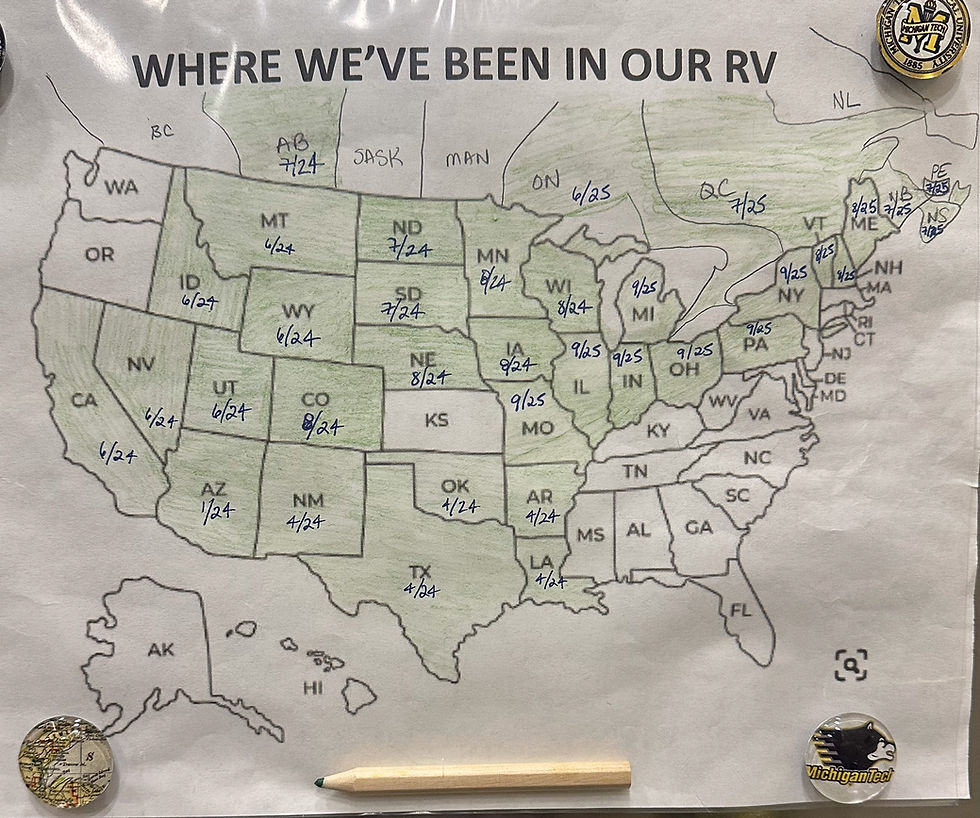We crossed Ontario, Canada
- cherylmccutcheon19
- Jul 3
- 4 min read
6/30/25 - Shortly after we left Grand Portage, MN, we were at the Canadian border in Ontario. Why were Pat and I so nervous?! The agent at the window was NOT welcoming and after reviewing our passports and asking us questions, told us to pull over for inspection. Two different agents, who were a bit friendlier, took about 10 minutes to inspect the truck and the RV. They said we didn't need to open the slides, so who knows what they inspected inside the RV since you can't open much when the slides are in. Regardless, they let us proceed!

We were very impressed with how beautiful this part of Ontario was: pretty inland lakes, many streams & rivers flowing towards Lake Superior, high bluffs, and lots of trees and wildflowers. Pat saw a moose (on an out-&-back boondoggle the nav system took us on) but I missed it.

Pat noticed that the RV hit 15,000 miles and the truck hit 25,000 miles (both tracked by the truck). After catching dinner at the slowest Subway shop ever, we arrived in Wawa, Ontario. Pat confirmed that night that his Great-grandfather Pete used to bring Pat's dad to this area to fish!

7/1/25 - We drove about 7 hours again this day.



Things I found interesting about Lake Superior: It is, by surface area, the world’s largest freshwater lake. It is ~350 x 160 miles. It contains as much water as all the other Great Lakes combined. It contains 10% of all the earth’s fresh surface water and there is enough water to flood all of North and South America to a depth of one foot (sssshhh…don’t tell CA/AZ/NV or they’ll try installing a pipe!!).
How it formed: About 1.1 to 1.2 billion years ago, a rift formed in the Earth's crust, creating a long scar from Kansas to Lake Superior. This rift led to volcanic activity and the depression that would eventually become the lake basin. Then, during the last ice age, massive glaciers carved and deepened the basin, and the subsequent melting of these glaciers filled the depression with water.
We had another nice campground (near the town of Spragge), this time near the Serpent River. Pat and I were able to fit in a short run (1st time since Idaho!!) and laundry before a late dinner.

7/2/25 - ANOTHER day of driving (we were trying to get to our east coast destination ASAP). Highlights: huge fields FILLED with eye-catching yellow flowers (canola if past research was correct).

We stopped just west of Ottawa, Canada (Canada's capital).

7/3/25 - We finally completed the drive through Ontario and entered Quebec. It was like driving into a totally different country because suddenly all writing was ONLY in French! We had noticed as we got close to the province border, Ontario had signs in both English AND French. It didn't give a welcoming feeling from Quebecois! Neither did their crap highways!! We passed by the city of Montreal, which I learned is an island. We completed another 7 hour day near Quebec City. We will spend 2 nights here, going into the city tomorrow for a walking tour and TBD.
Brief history of Canada (from Wikipedia): From the late 15th century, French and British expeditions explored, colonized, and fought over various places within North America in what constitutes present-day Canada. The colony of New France was claimed in 1534 with permanent settlements beginning in 1608. France ceded nearly all its North American possessions to Great Britain in 1763 after the Seven Years' War. The now-British Province of Quebec was divided into Upper and Lower Canada in 1791. The two provinces were united as the Province of Canada by the Act of Union 1840, which came into force in 1841. In 1867, the Province of Canada was joined with two other British colonies of New Brunswick and Nova Scotia. Over the next eighty-two years, Canada expanded by incorporating other parts of British North America, finishing with Newfoundland and Labrador in 1949.
Britain continued to set Canada’s foreign and defense policies until the end of World War I. The Patriation of the Constitution in 1982 marked the removal of legal dependence on the British parliament. Canada currently consists of ten provinces and three territories and is a parliamentary democracy (executive branch (the government) is drawn from and accountable to the legislative branch (the parliament) and a constitutional monarchy (the British monarch exercises their authority in accordance with a constitution and is not alone in making decisions).



Comments